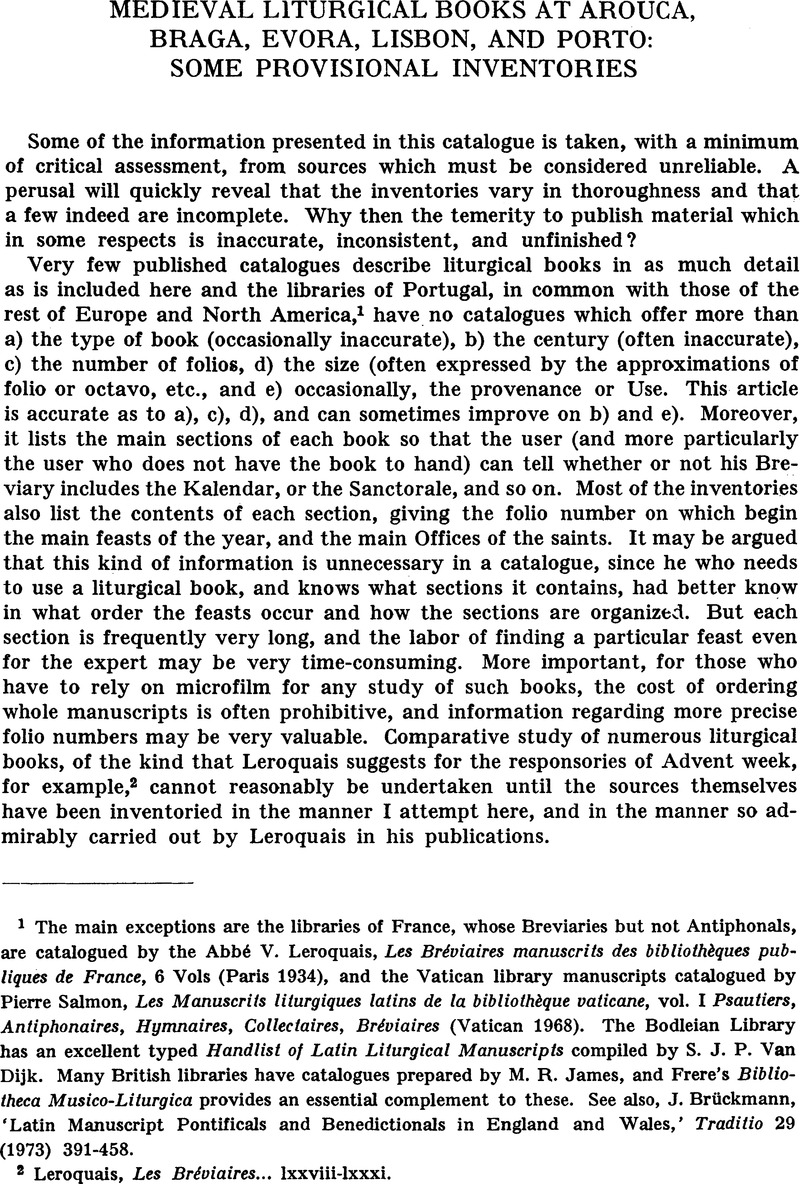Published online by Cambridge University Press: 29 July 2016

1 The main exceptions are the libraries of France, whose Breviaries but not Antiphonals, are catalogued by the Abb, é Leroquais, V., Les Bréviaires manuscrits des bibliothèques publiques de France , 6 Vols (Paris 1934 ), and the Vatican library manuscripts catalogued by Pierre Salmon, Les Manuscrits liturgiques latins de la bibliothèque vaticane, vol. I Psautiers, Antiphonaires, Hymnaires, Collectaires, Bréviaires (Vatican 1968). The Bodleian Library has an excellent typed Handlist of Latin Liturgical Manuscripts compiled by Van Dijk, S. J. P. Many British libraries have catalogues prepared by James, M. R., and Frere's, Bibliotheca Musico-Liturgica provides an essential complement to these. See also, Brückmann, J., ‘Latin Manuscript Pontificals and Benedictionals in England and Wales,' Traditio 29 (1973) 391–458.Google Scholar
2 Leroquais, , Les Bréviaires… lxxviii–lxxxi.Google Scholar
3 Generous grants from the Canada Council and then the Guggenheim Foundation allowed me to make several extended trips through Europe and Great Britain, and I should like to thank those institutions for their support. Google Scholar
4 This is not true of Cistercian manuscripts, which are in the majority in this article: his Office appears with the Sanctorale which, of course, in Cistercian sources normally begins with the feast of St. Stephen immediately following Christmas Day rather than with St. Andrew. Google Scholar
5 Corbin, Solange, Essai sur la musique religieuse porfugaise au moyen ǎge (Paris 1952) 165 and 243–245.Google Scholar
6 Corbin, , Essai 251–68.Google Scholar
7 There is still much inconsistency, and occasionally inaccuracy, in the naming of liturgical books, and the matter is indeed taxing. The Breviary includes rubrics and all the texts, spoken and sung, but only the texts, of the Offices, including the night Office of Matins and Lauds (no Diurnals or Nocturnals are in this catalogue). In the Noted Breviary, the sung items are provided with their plainsong. Antiphonals contain only the sung texts, with their plainsongs, of all the Offices. Google Scholar
8 Cappelli, A., Cronologia, Cronografia, e Calendario perpetuo (Milan 1930) 8.Google Scholar
9 Mosteiro de Arouca A arte em Portugal, No. 20 (Porto, 1960): text in Portuguese and French.Google Scholar